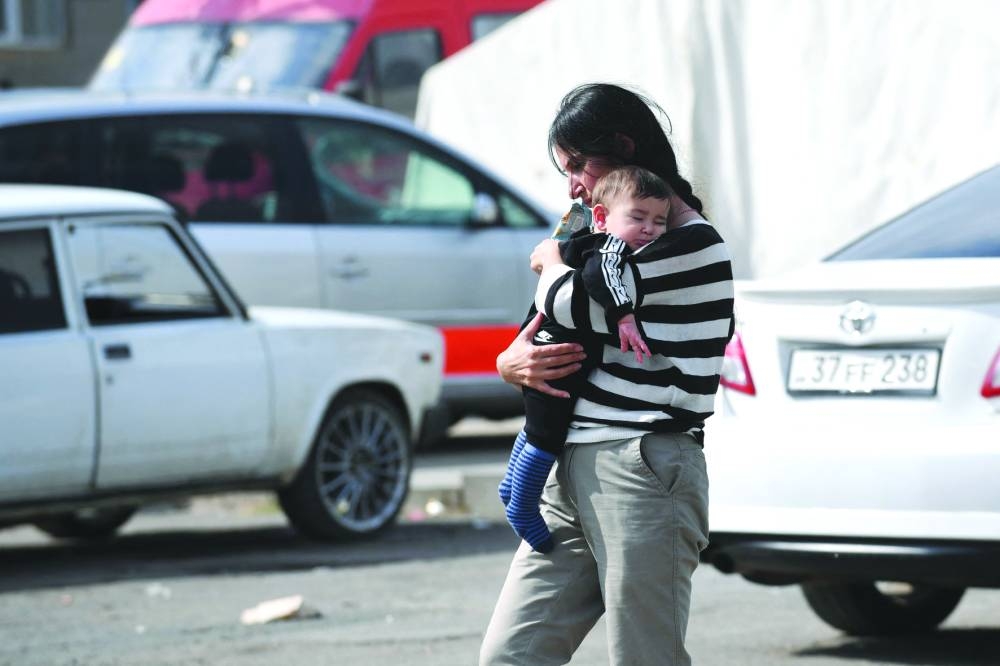The flood of refugees from Nagorno-Karabakh dwindled to a trickle yesterday as Armenia said nearly the entire population of the breakaway territory had already fled after Azerbaijan seized back control.
An AFP journalist at the Kornidzor crossing into Armenia saw only several ambulances arrive as border guards said they were waiting for a final few buses.
In the nearest town of Goris, hundreds of exhausted refugees waited amongst their baggage in the central square for the government to offer accommodation.
Azerbaijan’s lightning military takeover of the ethnic Armenian enclave last week sparked a sudden exodus that has rewritten the centuries-old ethnic makeup of the disputed region.
Armenia said yesterday 100,437 people from an estimated population of 120,000 had fled since the breakaway region saw its decades-long fight against Azerbaijani rule end in sudden defeat.
Yerevan said 14 bedridden patients had died during or shortly after having been evacuated along the lone mountain road out of the territory. Artak Beglaryan, a former separatist official, said “the last groups” of Nagorno-Karabakh residents were on their way to Armenia yesterday.
“At most a few hundred persons remain, most of whom are officials, emergency services employees, volunteers, some persons with special needs,” he wrote on social media.
Armenia — a country of 2.8mn — faces a major challenge housing the sudden influx of refugees and authorities said 35,000 were now in temporary accommodation.
Yerevan has accused Azerbaijan of conducting a campaign of “ethnic cleansing” to clear Nagorno-Karabakh of its Armenian population.
But Baku has denied the claim and has publicly called on the Armenian residents of the territory to stay and “reintegrate” into Azerbaijan.
The United Nations has said it will send a mission to Nagorno-Karabakh this weekend, mainly to assess humanitarian needs, the first time the international body has had access to the region in about 30 years. France lashed out at Azerbaijan for only allowing the mission in after most residents had already fled.
With tensions high between the Caucasus neighbours, Azerbaijan said one of its soldiers was killed by an Armenian sniper on their heavily militarised border.
Armenia quickly denied the accusation, saying the claim its forces had opened fire on Azerbaijani positions “does not correspond to reality”. Exchanges of fire along the border between the two Caucasus foes are common.
But so far the two sides have prevented the recent flare-up over Nagorno-Karabakh from spilling over into a broader confrontation. Azerbaijan’s 24-hour offensive to retake the enclave appears to have decisively ended the bloody struggle over the region’s status that has dragged on since the collapse of the Soviet Union.
The separatists agreed yesterday to dissolve their government and become a formal part of Azerbaijan by the end of the year. The decision marked the end of one of the world’s longest and seemingly most intractable “frozen conflicts” — one that Azerbaijan was able to finally win while longstanding Armenian ally Russia was bogged down in its war on Ukraine. Azerbaijan is now holding “re-integration” talks with separatist leaders while at the same time detained some senior figures from its former government and military command.
Former separatist foreign minister David Babayan, who announced earlier he would surrender, was the latest arrested by Baku. Some 3,000 opponents of Armenian Prime Minister Nikol Pashinyan resumed anti-government protests with a rally on Yerevan’s main square yesterday.
Pashinyan’s critics — who had paused demonstrations to focus on helping refugees — accuse him of abandoning the separatist region in the face of Azerbaijan’s aggression.

Armenian refugees from Nagorno-Karabakh are seen in the centre of the town of Goris yesterday before being evacuated in various Armenian cities. (AFP)
